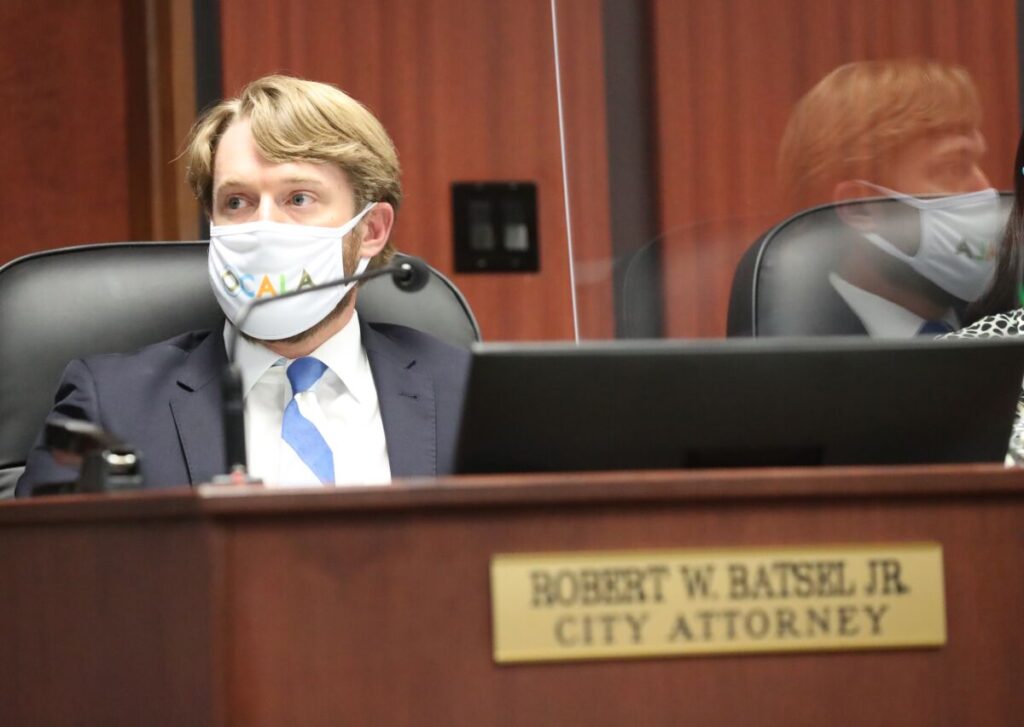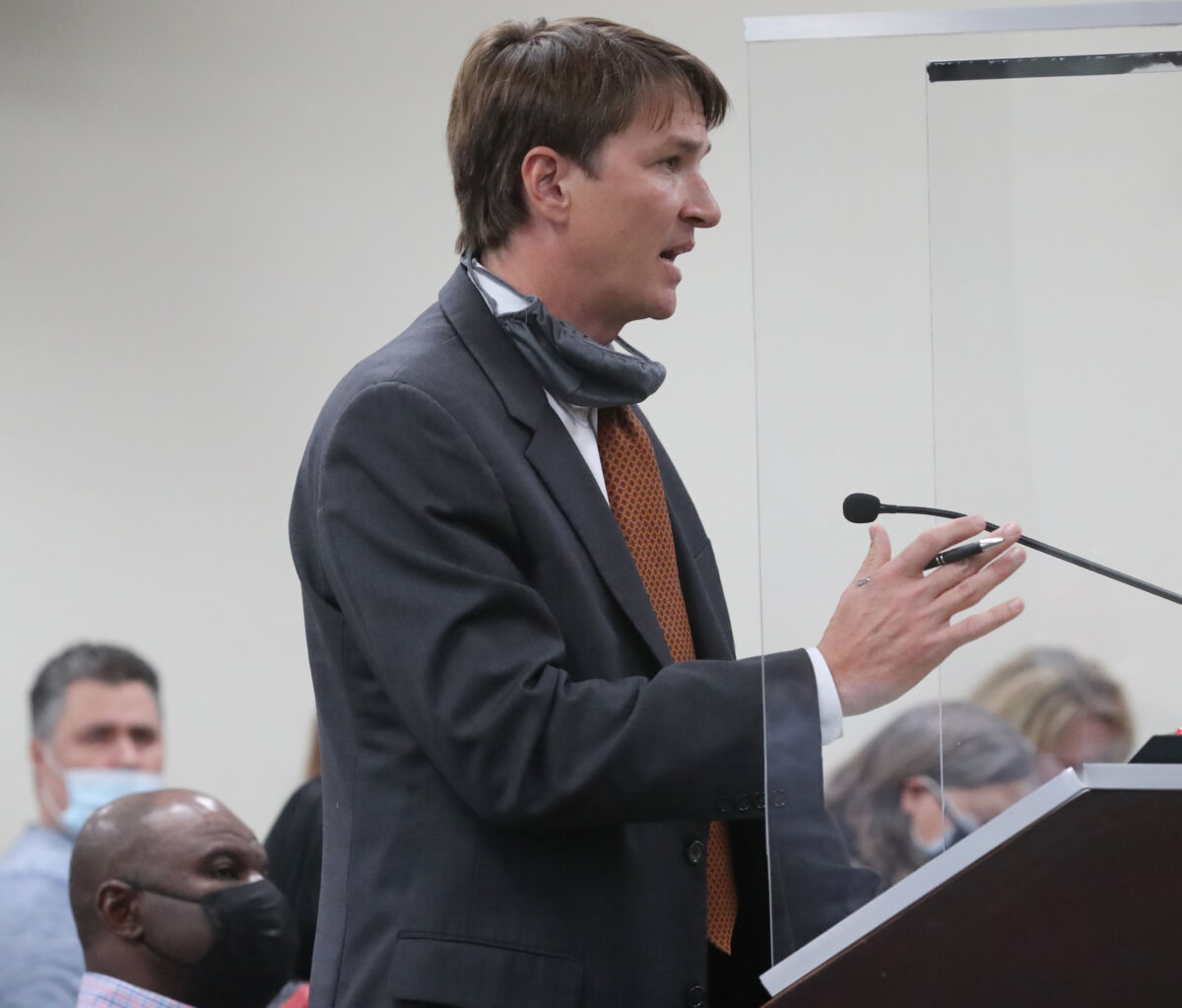City attorney outlines new (and expensive) strategy for latest challenge to fire fee assessment

City Attorney Robert Batsel Jr. speaks during an Ocala City Council meeting at Ocala City Hall in Ocala, Fla. on Tuesday, Dec. 15, 2020. [Bruce Ackerman/Ocala Gazette] 2020.

Fred Roberts, of Klein and Klein, LLC law firm, who was representing Carlton Arms of Ocala, voices his disagreement with the fire assessment fee during the Ocala City Council meeting at Ocala City Hall in Ocala on Jan. 19, 2021. [Bruce Ackerman/Ocala Gazette]
According to the complaint filed, Carlton Arms officials object to how the city assessed their multi-family homes at the same rate they calculated single family residences, at $286.15 per unit, while non-residential units were assessed by square footage with a cap.
Batsel assured the council members that the Carlton Arms case had nothing to do with the prior fire fee assessment first established in the 2006/2007 budget, which was amended many times and was challenged in court, resulting in more than seven years of litigation and a recent order requiring the city to pay $80 million in refunds.
This new challenge by Carlton Arms to the fire fee assessment, Batsel explained, was on the fire fee assessment the council instituted earlier this year.
“We are coming to you tonight requesting that we do what we considered doing with council back in 2007 and 2008 when Pat [Gilligan] recommended that we consider going forward with a bond validation proceeding then on the user fee. The bond validation under chapter 75 [of Florida Statutes] allows the city to basically go down to the courthouse, file a petition naming the state attorney as the respondent and anyone else who wants to intervene in this case. Carlton Arms would likely intervene,” he said.
“What you’re asking a court to do is look at the fire assessment and look at the debt obligation – in this case it would be debt borrowed to fund capital improvements, fire trucks – which are in this year’s and next year’s budget…and say to the judge, ‘The city intends to issue this debt to borrow to purchase these trucks and we need you to judge in this court to validate the city’s ability to do that legally and also the pledged revenue that’s going to repay the debt.’ In this case that’s the fire assessment,“ he continued.
“There is an expedited process. It’s not like a typical lawsuit that goes on and on. This is heard on an expedited basis” Batsel added. “The local circuit court makes a decision and a party who doesn’t like that decision, if they want to appeal that, goes straight to the Florida Supreme Court on an expedited review. And so, in a matter of months, we can have finality. I’ve told you this before; I’ll say it again – I have no concerns about the legality of our fire assessment. But it’s been challenged and we will have this final adjudication of the legality of that fire assessment for good – in terms of any challenges, not only the challenge of Carlton arms, but anyone else who would like to challenge it.
“It comes with an expense, but there’s a benefit in that our office won’t need – in all likelihood – to continue litigating this existing challenge [with Carlton Arms] because it will probably be consolidated into the bond validation proceeding, if we do this.”
Directing council members to an engagement agreement and legal memo on the strategy for the suit from the outside firm Bryant Miller Olive, which Batsel recommended the city council hire, he acknowledged the cost.
“It is not inexpensive. We’re talking about, you know, up to $300,000 in attorney’s fees paid outside counsel to do this. The reason we’re having this discussion again is this was discussed at some level in 2007, 2008. We didn’t do it. And, I know we don’t want to talk about Discount Sleep [the plaintiff that initiated the lawsuit that resulted in $80 million in refunds], but, at this point, it would have been nice if we invested early on to get a final decision and put the legality of that to rest moving forward. And, so we have an opportunity to do that.”
Batsel pointed to successful litigation results of the recommended firm on fire assessment fees through a bond validation strategy, but then acknowledged that “every fire assessment is different because we have to look very deep into the data and the methodology that we used to come up with the assessment that we ultimately arrived at.”
As he concluded, Batsel asked for any questions council members might have.
While no council member presented a question, Jay Musleh commented, “This seems like money well spent now. Do you need a motion on the matter?”
Batsel indicated he did not need a motion, only full consensus to move forward – which council members gave.
Following the meeting, Batsel did not respond to inquiries asking him to identify when and by what means city attorney Pat Gilligan recommended this bond validation strategy to city council in 2007 and 2008.
Minutes of the meetings between the city’s attorney and the council members and city managers since the 2006 fire fee assessment are not available to the public or to the Gazette until the case is concluded.
Historically, meetings between the city attorney and the city council are not open to the public and as a result commonly are referred to as “shade meetings,” since they are the opposite of normal city business held openly under Florida’s Government-in-the-Sunshine Law..
The only city employee who is included in shade meetings is the city manager, unless the city manager is unavailable and designates an assistant city manager in his or her place to provide information.
A review of the city council minutes associated with passing the fire assessment in 2007, however, do not reflect a bond validation strategy being presented. The assessment passed without any discussion.





